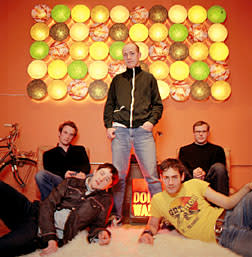The Promise Ring's Davey von Bohlen is good and ready to have his life back. After experiencing three years of health problems related to a brain tumour that was removed in 2000, von Bohlen has undergone the final surgery, which should signal a return to normal life. While the tumour's removal was a complete success, subsequent problems with infection left von Bohlen with a hole where a significant part of his skull should be. He underwent surgery in late March, almost exactly one month before the Promise Ring hit the road to support their brand new album Wood/Water. As the surgery signals the end of von Bohlen's health concerns and a new beginning in his life, the release of Wood/Water offers the equivalent for the Promise Ring. And while embarking on a tour so soon after surgery may be a bit hasty, after such a significant amount of time away, von Bohlen is ready.
"I wish I had more time, but it's very important to me to not have that problem any more," says von Bohlen. "I'm kinda sick of defending the back of my head. People come up and pat you on the head and that doesn't fly with me. It's just old. It's one of those things that for a while it was like: I'm fighting through it.' After a while, after a couple of surgeries, I can't remember a time when I didn't have to think about this, it's been three years."
While the Promise Ring obviously was not an active musical force during those years, the time allowed room for some contemplation not only by singer/guitarist von Bohlen, but also by drummer Dan Didier, guitarist Jason Gnewikow, and bassist Scott Schoenbeck regarding their dedication to the band, as well as the focus of its musical gaze. After the release of three full-length albums (as well as numerous EPs and seven-inches) on Delaware label Jade Tree, the band had time to step back and reassess not only their relationship as a band, but also with their label. At the end of all of that, von Bohlen, Didier and Gnewikow knew that what they didn't want more of the same. Schoenbeck wasn't in total agreement and eventually departed before recording sessions for Wood/Water began (he does play on one of the album's tracks).
The band also parted ways with Jade Tree and turned an eye to unrealised musical dreams. While the impact of von Bohlen's illness on the band is incalculable, the results of the imposed break are obvious. Ultimately von Bohlen, Didier and Gnewikow used their renewed dedication, and the resources of a new label, to reinvent the Promise Ring to reflect their evolving musical desires.
The result of all of this soul searching, Wood/Water, is a beautiful, laid-back album that presents a band almost unrecognisable from their previous musical efforts. It would be easy to dismiss the band's new direction as purely driven by von Bohlen's life-altering experiences; but the band was questioning its direction even before that critical event.
After releasing their first three albums with Jade Tree: 1996's 30° Everywhere, 1997's Nothing Feels Good and 1999's Very Emergency, the band were elevated as emo poster boys, an image inextricably linked to their label. Towing the emo party line became a grind for the band and when they were able to step back and gain some perspective, it became apparent that a new label was an important step in their evolution. But even before this, the band's self-evaluation was simmering after the release of Very Emergency. The band's first two records were the epitome of the sensitive guy lyrics and highly melodic guitar attack of emo, but Very Emergency was a headfirst dive into straight-up power pop. The narrow focus of that record left many fans reeling with disappointment. It also left von Bohlen and Didier dissatisfied and maybe even a little disillusioned with what they were accomplishing. Wood/Water's almost complete musical departure from the old Promise Ring is, in many ways, a reaction to Very Emergency. In some ways, von Bohlen's illness saved the Promise Ring by giving them the time to regroup without it, the band may not have survived to make a fourth full-length.
"I think inside of me there is a response to the simplicity of Very Emergency," says von Bohlen. "I think it's one of antagonism. I think we backed ourselves into a corner so much that it was a little bit aggravating, just too much. Certainly you want to move away from that. Not that I hate it, but we just became so one-dimensional that I think it was time to really focus on moving away from it. I think that's probably good. I'd like to think that's the life blood of an artist, is always being on the move. Music doesn't need a comfortable chair and I think that's the one major problem with popular music there are a lot of Lazy Boys that songs are sitting in," says von Bohlen.
"The problem was Very Emergency," says Dan Didier. "I like the record, it's fine, it was what it was. But touring that record over and over again, and I guess just touring in general, we just got burned out of doing that sort of stuff the whole two guitars, drums, bass kind of stuff. When Davey got sick and we put the band aside, we got a chance to figure out what we actually wanted to do. We were like, This is not what we want to do anymore. If we do another record like Very Emergency, let's just not be a band.'"
With Wood/Water, the core trio has launched what is essentially a brand new band with a brand new attitude. "To us it seems like we've been gone a lot longer than it seems like to other people," says von Bohlen. "To us, a day feels like a month. At some point we felt like the band was gone and we had been changed; we felt like we broke up and started a new band, and just forgot to change our name. That's kind of how we approached it."
An important element in the band's development involved leaving Jade Tree, eventually signing with Epitaph label Anti (home of Tom Waits, Merle Haggard and Buju Banton). According to Didier, fulfilling the requirements of being an "emo band" on Jade Tree became, to some extent, like a nine-to-five job. The constant cycle of recording and touring was wearing thin on the band, both musically and personally. While for indie purist fans leaving the label was blasphemy how dare they bite the hand that feeds and leave such hallowed ground? there is little question that Wood/Water would never have otherwise come to fruition. It was important not only to distance themselves from the emo label that dogs them both, but also to explore musical horizons that might involve more than the limited budget an indie label could offer.
"We needed the recording budget, that was the major issue. If we stayed on Jade Tree, I think there would have been a lot more pressure to just continue making records like we had been," says Didier. "And that would've ultimately ended the band, because we would have got fed up with it. It was our decision to break away from that and go to a label that could give us a bigger recording budget and just be a part of a label that doesn't really have an identity."
"Financially we outspent probably the first six years of our band, that's a pretty big deal," says von Bohlen. "We wanted to make the record we really wanted to make, so the financial thing bought us time more than bought us a better record. That's what we really wanted the time. We are at least middle-age as a band and maybe it's our mid-life crisis, you want to do the things you know you want before the end. And absolutely what we wanted to do was make a record we thought through that we listened to everything we recorded and made sure, instead of like, Well, we've worked on this long enough, we have to move on.' So that was important. We were tired of our job. The air's out of the balloon and luckily we're a band and not a life, so we have the ability to go, You know what? Shut it down and start over.' I think there was more for us to do than what we had done. It wouldn't have been at all the invigorating thing to do to make a record that sounded like our last record."
In not repeating Promise Ring history, the band looked back into their own pasts when contemplating a producer for Wood/Water. Didier, a die-hard fan of the Smiths and Blur's Parklife record (as are von Bohlen and Gnewikow), looked to producer Stephen Street. What Street brought to Wood/Water was an ignorance of the Promise Ring "sound," which freed the band from the obligation of fulfilling preconceived notions, to fully explore the sounds they desired.
"I think that probably shaped our record more than anything else," admits von Bohlen. "Stephen hadn't heard our other records, which is great. I think once he said, You guys are more like an American rock band, and this isn't that. Is the record company aware? Should we be recording some of the bigger songs?' And we were like, No. Only if they're better.'"
What Street helped capture is the sound of a band that, unsurprisingly considering what its members have gone through in the last three years, has matured significantly. Loud guitars and the careening energy of previous releases have been replaced by a lush, almost pastoral feel. The songs on Wood/Water don't need to rush to make their points before the flame goes out, but instead burn slowly, stopping to contemplate life and imprinting themselves in the memory with effortless grace. Tinges of alt-country and vaguely psychedelic pop have been smoothly shaken into a satisfying and heady sound. Never before would anyone have guessed that what the Promise Ring really wanted was to create epic tracks that include strings and a choir. Keyboards flesh out the songs with superb flourishes (along with new bass player Ryan Weber, the band also includes keyboardist B.J. Seidel) beautiful enough to make one weep. Wood/Water is a record that demolishes preconceptions and opens up a world of possibilities; it's about open windows, not closed doors and presents a band who are not embarrassed to recognise their own personal growth. And while the members of the band are no longer the idealistic 19 year-olds they once might have been, some of this maturity must be attributed to von Bohlen's illness and its repercussions on the band.
"As far as the word mature goes, people say, I hate to say mature,' but why?" von Bohlen wonders. "You're complimenting me as an individual. I feel more mature and I think that's something, and hopefully if it reflects in my music, that just speaks to the strength of my maturity as a human. So there's nothing wrong with that, I don't shy away from that at all. It doesn't mean I'm calling movies films it's not a measure of pretentiousness."
With maturity comes the ability to accept the fact that you're never going to please everyone all of the time, whether it be personally or professionally. And while the Promise Ring are certainly no strangers to the questioning glances and all out backlash from fans, Wood/Water may prove to be a watershed on that issue. They've gained enough perspective to continue on their own sweet way.
"I think we're aware that there are many, many people who won't want to hear what's on our new record and I applaud that," says von Bohlen. "I say, do what you gotta do. And I would hope I could have the same kind of thing back. Hopefully the record store will give you a good deal on the [trade-in] if you do buy it!"
Oddly, what may cause the most problems for fans is something von Bohlen sees as an aspect of the band that never really existed in the first place. While Wood/Water and von Bohlen's regained healthfulness find the band treading on a whole lot of new ground, there are some things which haven't changed, whether fans think so or not.
"There seems to be a question of, They're not angry any more!' which is funny because we were never really bucking the system, certainly not in our musical life."
So the Promise Ring were never really the emo Rage Against the Machine? "Really," says von Bohlen, "we only like to rage against the machine at home."
"I wish I had more time, but it's very important to me to not have that problem any more," says von Bohlen. "I'm kinda sick of defending the back of my head. People come up and pat you on the head and that doesn't fly with me. It's just old. It's one of those things that for a while it was like: I'm fighting through it.' After a while, after a couple of surgeries, I can't remember a time when I didn't have to think about this, it's been three years."
While the Promise Ring obviously was not an active musical force during those years, the time allowed room for some contemplation not only by singer/guitarist von Bohlen, but also by drummer Dan Didier, guitarist Jason Gnewikow, and bassist Scott Schoenbeck regarding their dedication to the band, as well as the focus of its musical gaze. After the release of three full-length albums (as well as numerous EPs and seven-inches) on Delaware label Jade Tree, the band had time to step back and reassess not only their relationship as a band, but also with their label. At the end of all of that, von Bohlen, Didier and Gnewikow knew that what they didn't want more of the same. Schoenbeck wasn't in total agreement and eventually departed before recording sessions for Wood/Water began (he does play on one of the album's tracks).
The band also parted ways with Jade Tree and turned an eye to unrealised musical dreams. While the impact of von Bohlen's illness on the band is incalculable, the results of the imposed break are obvious. Ultimately von Bohlen, Didier and Gnewikow used their renewed dedication, and the resources of a new label, to reinvent the Promise Ring to reflect their evolving musical desires.
The result of all of this soul searching, Wood/Water, is a beautiful, laid-back album that presents a band almost unrecognisable from their previous musical efforts. It would be easy to dismiss the band's new direction as purely driven by von Bohlen's life-altering experiences; but the band was questioning its direction even before that critical event.
After releasing their first three albums with Jade Tree: 1996's 30° Everywhere, 1997's Nothing Feels Good and 1999's Very Emergency, the band were elevated as emo poster boys, an image inextricably linked to their label. Towing the emo party line became a grind for the band and when they were able to step back and gain some perspective, it became apparent that a new label was an important step in their evolution. But even before this, the band's self-evaluation was simmering after the release of Very Emergency. The band's first two records were the epitome of the sensitive guy lyrics and highly melodic guitar attack of emo, but Very Emergency was a headfirst dive into straight-up power pop. The narrow focus of that record left many fans reeling with disappointment. It also left von Bohlen and Didier dissatisfied and maybe even a little disillusioned with what they were accomplishing. Wood/Water's almost complete musical departure from the old Promise Ring is, in many ways, a reaction to Very Emergency. In some ways, von Bohlen's illness saved the Promise Ring by giving them the time to regroup without it, the band may not have survived to make a fourth full-length.
"I think inside of me there is a response to the simplicity of Very Emergency," says von Bohlen. "I think it's one of antagonism. I think we backed ourselves into a corner so much that it was a little bit aggravating, just too much. Certainly you want to move away from that. Not that I hate it, but we just became so one-dimensional that I think it was time to really focus on moving away from it. I think that's probably good. I'd like to think that's the life blood of an artist, is always being on the move. Music doesn't need a comfortable chair and I think that's the one major problem with popular music there are a lot of Lazy Boys that songs are sitting in," says von Bohlen.
"The problem was Very Emergency," says Dan Didier. "I like the record, it's fine, it was what it was. But touring that record over and over again, and I guess just touring in general, we just got burned out of doing that sort of stuff the whole two guitars, drums, bass kind of stuff. When Davey got sick and we put the band aside, we got a chance to figure out what we actually wanted to do. We were like, This is not what we want to do anymore. If we do another record like Very Emergency, let's just not be a band.'"
With Wood/Water, the core trio has launched what is essentially a brand new band with a brand new attitude. "To us it seems like we've been gone a lot longer than it seems like to other people," says von Bohlen. "To us, a day feels like a month. At some point we felt like the band was gone and we had been changed; we felt like we broke up and started a new band, and just forgot to change our name. That's kind of how we approached it."
An important element in the band's development involved leaving Jade Tree, eventually signing with Epitaph label Anti (home of Tom Waits, Merle Haggard and Buju Banton). According to Didier, fulfilling the requirements of being an "emo band" on Jade Tree became, to some extent, like a nine-to-five job. The constant cycle of recording and touring was wearing thin on the band, both musically and personally. While for indie purist fans leaving the label was blasphemy how dare they bite the hand that feeds and leave such hallowed ground? there is little question that Wood/Water would never have otherwise come to fruition. It was important not only to distance themselves from the emo label that dogs them both, but also to explore musical horizons that might involve more than the limited budget an indie label could offer.
"We needed the recording budget, that was the major issue. If we stayed on Jade Tree, I think there would have been a lot more pressure to just continue making records like we had been," says Didier. "And that would've ultimately ended the band, because we would have got fed up with it. It was our decision to break away from that and go to a label that could give us a bigger recording budget and just be a part of a label that doesn't really have an identity."
"Financially we outspent probably the first six years of our band, that's a pretty big deal," says von Bohlen. "We wanted to make the record we really wanted to make, so the financial thing bought us time more than bought us a better record. That's what we really wanted the time. We are at least middle-age as a band and maybe it's our mid-life crisis, you want to do the things you know you want before the end. And absolutely what we wanted to do was make a record we thought through that we listened to everything we recorded and made sure, instead of like, Well, we've worked on this long enough, we have to move on.' So that was important. We were tired of our job. The air's out of the balloon and luckily we're a band and not a life, so we have the ability to go, You know what? Shut it down and start over.' I think there was more for us to do than what we had done. It wouldn't have been at all the invigorating thing to do to make a record that sounded like our last record."
In not repeating Promise Ring history, the band looked back into their own pasts when contemplating a producer for Wood/Water. Didier, a die-hard fan of the Smiths and Blur's Parklife record (as are von Bohlen and Gnewikow), looked to producer Stephen Street. What Street brought to Wood/Water was an ignorance of the Promise Ring "sound," which freed the band from the obligation of fulfilling preconceived notions, to fully explore the sounds they desired.
"I think that probably shaped our record more than anything else," admits von Bohlen. "Stephen hadn't heard our other records, which is great. I think once he said, You guys are more like an American rock band, and this isn't that. Is the record company aware? Should we be recording some of the bigger songs?' And we were like, No. Only if they're better.'"
What Street helped capture is the sound of a band that, unsurprisingly considering what its members have gone through in the last three years, has matured significantly. Loud guitars and the careening energy of previous releases have been replaced by a lush, almost pastoral feel. The songs on Wood/Water don't need to rush to make their points before the flame goes out, but instead burn slowly, stopping to contemplate life and imprinting themselves in the memory with effortless grace. Tinges of alt-country and vaguely psychedelic pop have been smoothly shaken into a satisfying and heady sound. Never before would anyone have guessed that what the Promise Ring really wanted was to create epic tracks that include strings and a choir. Keyboards flesh out the songs with superb flourishes (along with new bass player Ryan Weber, the band also includes keyboardist B.J. Seidel) beautiful enough to make one weep. Wood/Water is a record that demolishes preconceptions and opens up a world of possibilities; it's about open windows, not closed doors and presents a band who are not embarrassed to recognise their own personal growth. And while the members of the band are no longer the idealistic 19 year-olds they once might have been, some of this maturity must be attributed to von Bohlen's illness and its repercussions on the band.
"As far as the word mature goes, people say, I hate to say mature,' but why?" von Bohlen wonders. "You're complimenting me as an individual. I feel more mature and I think that's something, and hopefully if it reflects in my music, that just speaks to the strength of my maturity as a human. So there's nothing wrong with that, I don't shy away from that at all. It doesn't mean I'm calling movies films it's not a measure of pretentiousness."
With maturity comes the ability to accept the fact that you're never going to please everyone all of the time, whether it be personally or professionally. And while the Promise Ring are certainly no strangers to the questioning glances and all out backlash from fans, Wood/Water may prove to be a watershed on that issue. They've gained enough perspective to continue on their own sweet way.
"I think we're aware that there are many, many people who won't want to hear what's on our new record and I applaud that," says von Bohlen. "I say, do what you gotta do. And I would hope I could have the same kind of thing back. Hopefully the record store will give you a good deal on the [trade-in] if you do buy it!"
Oddly, what may cause the most problems for fans is something von Bohlen sees as an aspect of the band that never really existed in the first place. While Wood/Water and von Bohlen's regained healthfulness find the band treading on a whole lot of new ground, there are some things which haven't changed, whether fans think so or not.
"There seems to be a question of, They're not angry any more!' which is funny because we were never really bucking the system, certainly not in our musical life."
So the Promise Ring were never really the emo Rage Against the Machine? "Really," says von Bohlen, "we only like to rage against the machine at home."




